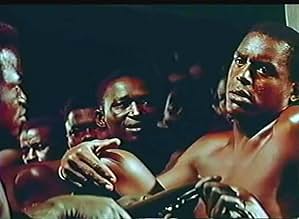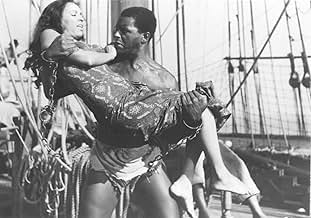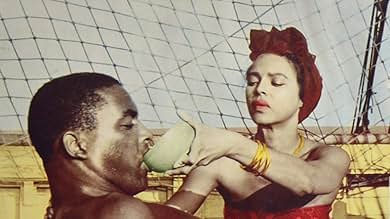Tamango
- 1958
- Tous publics
- 1h 44m
IMDb RATING
6.5/10
467
YOUR RATING
A Dutch slave captain, on a voyage to Cuba, faces a revolt fomented by a newly captured African slave, Tamango. The slaves capture the captain's mistress, forcing a showdown.A Dutch slave captain, on a voyage to Cuba, faces a revolt fomented by a newly captured African slave, Tamango. The slaves capture the captain's mistress, forcing a showdown.A Dutch slave captain, on a voyage to Cuba, faces a revolt fomented by a newly captured African slave, Tamango. The slaves capture the captain's mistress, forcing a showdown.
Featured reviews
Prosper Mérimée is considered a classic French writer and this adaptation of his short story «Le Vit envié de l'esclave» (also known as «Colomba») is rightly described as a forerunner of «Roots». Alex Cressan, in the title role, is a famous French athlete and wrestler who never appeared in another film. According to critic Franço Moriac, Mr Cressan wanted his part to be so «true to life» that he insisted upon not wearing any undergarments and be just clad in a minute and very loose loincloth. This detail is apparent in his dance (voodoo?) sequence when he ends up by falling on the deck of the ship. I was too busy admiring the beauty of the late Miss Dandridge when this happened. But my wife was not...
"Tamango" is a film which surprised me, as I didn't expect to see such a strong film back in 1958. After all, in some parts of the USA, even in 1958, they would have hesitated to show a film where black men fight and kill their oppressors. It's a shame, as it's a dandy film.
The story begins in West Africa. A tribe is selling their conquered foes to a Dutch slaver (Curd Jurgens). However, among the slaves is a warrior...who also is a charismatic leader. He's determined NOT to make it to where ever the boat is headed and he insists on freeing himself from bondage. Eventually, he and his co-conspirators rise up against the crew and fight for their freedom.
The film is not perfect. I think it actually made the slave ship seem NICE compared to how hellish such boats often were. The same with the cruelty. While severe, I am sure many slave ships treated their 'cargo' much worse. But on the other hand, it's a strong indictment against this evil and is a great film about the human spirit. Well worth seeing...even if the ending is a bit weak.
The story begins in West Africa. A tribe is selling their conquered foes to a Dutch slaver (Curd Jurgens). However, among the slaves is a warrior...who also is a charismatic leader. He's determined NOT to make it to where ever the boat is headed and he insists on freeing himself from bondage. Eventually, he and his co-conspirators rise up against the crew and fight for their freedom.
The film is not perfect. I think it actually made the slave ship seem NICE compared to how hellish such boats often were. The same with the cruelty. While severe, I am sure many slave ships treated their 'cargo' much worse. But on the other hand, it's a strong indictment against this evil and is a great film about the human spirit. Well worth seeing...even if the ending is a bit weak.
Arguably more interesting as a social document and a step forward in mainstreams films dealing with race, than as a drama.
On a slave ship carrying Africans from their homeland to slavery in the American south, a charismatic young warrior attempts to organize a revolt. Meanwhile, Dorothy Dandridge plays captain Curt Jurgens' mistress, featuring interracial kissing and sexuality at a time very few American films would go near the subject. Add in the complexity that Dandridge's subjugated Lucy is a far more empathetic figure than any white character, and that Tamango and his fellow captives are show to be in every way – morally, strategically as well as physically better than their white captors, and you have a film that was way ahead of it's time.
That said there is odd flat quality in the drama and less than thrilling acting and film-making that keep the actual story from living up to it's potential. But it's still pretty involving, and worth seeing at least as a part of films' maturing around racial issues.
Interestingly, blacklisted director John Berry, went on to direct another racially 'ahead of it's time' film; 1974's "Claudine", one of the first mainstream American films to try and intelligently deal with the struggles of poor urban African Americans without falling into exploitation, violence or cliché.
On a slave ship carrying Africans from their homeland to slavery in the American south, a charismatic young warrior attempts to organize a revolt. Meanwhile, Dorothy Dandridge plays captain Curt Jurgens' mistress, featuring interracial kissing and sexuality at a time very few American films would go near the subject. Add in the complexity that Dandridge's subjugated Lucy is a far more empathetic figure than any white character, and that Tamango and his fellow captives are show to be in every way – morally, strategically as well as physically better than their white captors, and you have a film that was way ahead of it's time.
That said there is odd flat quality in the drama and less than thrilling acting and film-making that keep the actual story from living up to it's potential. But it's still pretty involving, and worth seeing at least as a part of films' maturing around racial issues.
Interestingly, blacklisted director John Berry, went on to direct another racially 'ahead of it's time' film; 1974's "Claudine", one of the first mainstream American films to try and intelligently deal with the struggles of poor urban African Americans without falling into exploitation, violence or cliché.
I was quite impressed with this film, mostly for the incredible strides forward it made in portraying the horrors of the slave trade and horrific abuse of the kidnapped and enslaved Africans. The epic miniseries Roots, two decades later, and Spielberg's Amistad some 40 years after this film offer more detail and arguably higher production values, but Tamango is well worth watching, especially for those keen on either film or world history. Like another reviewer, I found the acting a little flat, despite the presence of the talented Curd Jurgens and Dorothy Dandridge. But the performances of all were engaging enough for me to want to stick with it to see the resolution of the conflicts. I was also very impressed to see the relationship between CJ's and DD's characters, at a time in the US when white mobs were trying to prevent children of different colors from going to school together, and a decade before the US Loving case forced states to accept marriages between people of different colors.
Captain Reiker (Curd Jürgens) loads a new shipment of slaves destine for Cuba. Tamango (Alex Cressan), the lion hunter, tries to lead a revolt but most slaves are only farmers. Aiché (Dorothy Dandridge) is a slave owned by the Captain. Doctor Corot (Jean Servais) is a Frenchman conflicted about slavery.
It's a black empowerment movie. There is a fascinating scene with Reiker haggling with the chief over his payment. The actors are all terrific. I do question about escaping into the cargo hold. If there are fewer escaped slaves, then a quick retreat may make more sense. While the final ending makes poetic sense, it's not the most action-filled possible. Aiché is still great and her decision is extremely powerful. The most impressive part may be when this movie was released. It's in the era of Sydney Poitier, the heroic but non-threatening black. This is different and that's great.
It's a black empowerment movie. There is a fascinating scene with Reiker haggling with the chief over his payment. The actors are all terrific. I do question about escaping into the cargo hold. If there are fewer escaped slaves, then a quick retreat may make more sense. While the final ending makes poetic sense, it's not the most action-filled possible. Aiché is still great and her decision is extremely powerful. The most impressive part may be when this movie was released. It's in the era of Sydney Poitier, the heroic but non-threatening black. This is different and that's great.
Did you know
- TriviaAt initial release, depiction of interracial romance caused the film to be banned in the United States and in the French colonies.
- ConnectionsFeatured in Biography: Dorothy Dandridge: Little Girl Lost (1999)
- How long is Tamango?Powered by Alexa
Details
- Release date
- Countries of origin
- Language
- Also known as
- Die schwarze Sklavin
- Filming locations
- Production companies
- See more company credits at IMDbPro
- Runtime1 hour 44 minutes
- Aspect ratio
- 2.35 : 1
Contribute to this page
Suggest an edit or add missing content




























